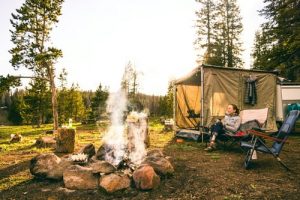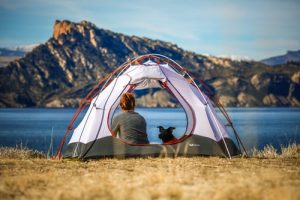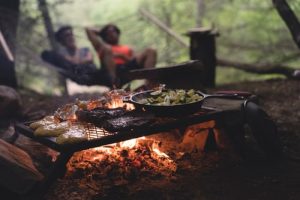Table of Contents
Right now, when we’re so limited when it comes to traveling, going on a camping trip is the best and safest way to leave the house, experience an adventure and have loads of fun. However, whether you’ll have a good or bad camping experience usually boils down to one thing: your equipment. Having all the essentials at hand can make a difference between reaching Zen among trees and rushing to an emergency room. So, no matter if you’re a first-time camper or someone with a little more outdoor experience, here are a few items you must not leave your home without.
 Good camping tent
Good camping tent
Even if you’re planning to sleep under the open sky, it’s always a good idea to have a tent for emergencies. This way, you’ll stay warm and dry in case of a sudden shower or heavy morning dew. Also, a tent can protect your equipment from the elements and keep your food safe from nosy critters.
Warm sleeping bag
Once the sun goes down, sleeping in your shorts might not sound like such a good idea anymore. In nature, temperatures can drop significantly overnight, often over 20 degrees. Additionally, many insects come out at night and they might be attracted to your unprotected body. All in all, going on a camping trip without a sleeping bag can result in an uncomfortable sleep at best, but it can also cause hypothermia and other issues that will cut your trip short.
Fire starter
One can’t even imagine a camping trip with the crackle of a warm campfire, so you’ll definitely need tools to start yours quickly and effortlessly.

While you can take the old-fashioned way and rub sticks together, it’s easier to just pack one or two lighters and boxes of matches. If you’re going somewhere humid and wet, it’s also smart to pack some kindling (dry bark, paper, lint) and place it in a waterproof container. Finding dry kindling in nature can be hard, especially in the fall.
Reliable knife
A knife is one of the most important things you can have with you in nature. If you want something sturdy, check out reliable otf knives that are practical, durable and sharp, thus suitable for all sorts of tasks. Your knife will assist you with cutting rope, preparing food, opening packages, sharpening sticks and even skinning animals or gutting fish. Without a knife, all of the aforementioned tasks will be practically impossible to pull off.
First aid kit
While it’s unlikely you’ll get seriously injured during your camping adventure, you can expect some minor cuts, bruises and blisters that might require treatment. If not treated correctly, even the smallest of cuts can get infected and cause various health complications. So, it’s best to always have a first aid kit with you containing bandaids, bandages, antiseptic and painkillers. If you have some spare space in your first aid kit, throw in some scissors, adhesive, emergency whistle and sunscreen. Sunburns can be just as dangerous as cuts.
 Cooking equipment
Cooking equipment
If you’re planning to only eat dehydrated meals, that’s totally fine, but it’s always more enjoyable to have something freshly made. In that case, you’ll need cooking equipment like plates, utensils, a pan and a pot. Throw in a can opener and some dish soap as well—these don’t take too much space in your backpack. If you don’t have experience with cooking over an open fire, you can pack a small camping stove that will make any meal prep a breeze.
Lighting
Your campfire might be big and bright, but you can’t take it with you anywhere. If you need to go looking for something in your tent or need a bathroom break during the night, a portable lantern will come in very handy. If practicality is your biggest concern, grab a small headlamp that will keep your hands free at all times.
Bug repellent
Depending on where you live, you can come across many annoying bugs from mosquitoes to black flies and deer flies, so always have some effective bug repellent with you. And don’t forget to pack an anti-itch cream for those nasty insect bites or poison ivy encounters. If you’re concerned about the eco-friendliness of your bug repellent, check the markets for something green or even make your own spray at home.
Toilet paper
Many minimalist campers and survivalists don’t think you need toilet paper when spending time in nature, but it’s a necessity if you’re looking to be clean and comfortable. While you can use leaves and bark, they don’t make a good replacement (they can even cause injury to your sensitive areas). Additionally, if you’re camping somewhere with bathroom access, just know that they often run out of TP. It’s best to invest in biodegradable toilet paper so you don’t have to worry about polluting nature.
Once you have all these things in your backpack or car, you’re 100% ready to have a safe and fun nature adventure. Good luck and make sure to take care of nature the way it takes care of you!

 Good camping tent
Good camping tent Cooking equipment
Cooking equipment